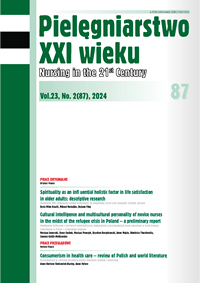Ocena funkcji poznawczych seniorów żyjących w społeczności lokalnej
DOI:
https://doi.org/10.2478/pielxxiw-2024-0021Słowa kluczowe:
jakość życia, depresja, lęk, seniorzy, funkcja poznawczaAbstrakt
OCENA FUNKCJI POZNAWCZYCH SENIORÓW ŻYJĄCYCH W SPOŁECZNOŚCI LOKALNEJ
Cel pracy. Badanie miało na celu ocenę stanu funkcji poznawczych u seniorów mieszkających w społeczności lokalnej oraz ustalenie zależności między funkcjami poznawczymi a wybranymi aspektami życia.
Materiał i metody. Populacja badana składała się z 330 żyjących w lokalnej społeczności respondentów w wieku powyżej 60 lat. Funkcje poznawcze badanych oceniano za pomocą Montrealskiej Skali Oceny Funkcji Poznawczych (MoCA), objawy lękowe za pomocą Geriatrycznego Inwentarza Lęku (GAI), a objawy depresji przy pomocy Geriatrycznej Skali Oceny Depresji (GDS-15). Jakość życia oceniano przy użyciu kwestionariusza oceny jakości życia osób starszych (OPQOL-BRIEF).
Wyniki. Średni całkowity wynik w teście MoCA wyniósł 26,2 punktów (SD = 2,3; min. 19; maks. 30), zaś 63,7% badanych uzyskało wynik mieszczący się w normie. Niższy średni wynik MoCA odnotowano u osób, u których zdiagnozowano depresję (p = 0,012). To samo dotyczyło osób, u których stwierdzono lęki (p < 0,001). Znacząco gorsze wyniki MoCA stwierdzono u osób, które już nie pracowały (p = 0,027).
Wnioski. Ze względu na potrzebę wczesnego wykrywania demencji ocena funkcji poznawczych u osób starszych nie powinna być lekceważona. Oprócz działań, które mogą poprawić funkcje poznawcze, istnieje potrzeba wspierania w praktyce aktywności, które koncentrują się na zmniejszaniu objawów lęku i depresji u osób starszych.
Bibliografia
1. Squires A, Hastings M. Rehabilitation of the Older Person, a Handbook for the Interdisciplinary Team. 3rd ed. Cheltenham, UK: Nelson Hornes; 2017.
2. World Health Organization. 2020. Dementia. from https://www.who.int/news¬room/fact-sheets/detail/dementia.
3. Bai W, Chen P, Cai H, et al. Worldwide prevalence of mild cognitive impairment among community dwellers aged 50 years and older: a meta-analysis and systematic review of epidemiology studies. Age and Ageing. 2022; 51(8). doi: 10.1093/ageing/afac173.
4. Broulíková HM, Kučera M, Arltová M. The Timely Diagnosis and Treatment of Alzheimer’s Disease: Microsimulating Cost-Effectiveness in the Czech Republic. Demografie. 2021; 63(4): 216-225. doi: 10.546994/dem.0287.
5. Pietrzak B, Kujawa J, Lipert A. Depressive Disorders, Cognitive and Physical Function of Older People in Early Dementia Detection. Life. 2023; 13(2010). doi:10.3390/ life13102010.
6. Bartoš A, Orlíková H, Raisová M, et al. Česká tréninková verze Montrealského kognitivního testu (MoCA-CZ1) k časné detekci Alzheimerovy nemoci. Cesk. Slov. Neurol. N. 2014; 77/110(5): 587-595.
7. Pachana NA, Byrne GJ, Siddle H, et al. Development and validation of the Geriatric Anxiety Inventory. Int. Psychogeriatr. 2007; 19(1): 103-114. doi: 10.1017/ S1041610206003504.
8. Sheikh JI, Yesavage JA. Geriatric Depression Scale (GDS): recent evidence and development of a shorter version. [in:] Brink TL, ed. Clinical Gerontology: A Guide to Assessment and Intervention. New York: Haworth Press. 1986: 165-173.
9. Bowling A, Hankins M, Windle G, et al. A short measure of quality of life in older age: the performance of the brief Older People’s Quality of Life questionnaire (OPQOL-brief). Arch. Gerontol. Geriatr. 2013; 56(1): 181-187. doi: 10.1016/j. archger.2012.08.012.
10. Carson N, Leach L, Murphy KJ. A re-examination of Montreal cognitive assessment (MoCA) cutoff scores. Int. J. Geriatr. Psychiatry. 2018; 33: 379-388. doi: org/10.1002/ gps.4756.
11. Rossetti HC, Lacritz LH, Hynan LS, et al. Montreal Cognitive Assessment performance among community-dwelling African Americans. Arch. Clin. Neuropsycho. 2017; 32: 238-244.
12. Larouche E, Tremblay MP, Potvin O, et al. Normative data for the MontrealCognitive Assessment in middle-aged and elderly Quebec–French People. Arch. Clin. Neuropsychol. 2016; 31: 819-826.
13. Freitas S, Simões MR, Alves L, et al. Montreal cognitive assessment:validation study for mild cognitive impairment and Alzheimer disease. Alzheimer Disease & Associated Disorders. 2013, 27: 37-43.
14. Santangelo G, Siciliano M, Pedone R, et al. Normative data for the Montreal Cognitive Assessment in an Italian population sample. Neurological Sciences. 2015; 36: 585-591.
15. Hill NL, et al. Subjective cognitive impairment and quality of life: a systematic review. Int. Psychogeriatr. 2017; 29, 1965-1977. oi.org/10.1017/s1041610217001636.
16. Beaudreau SA, Petkus AJ, Hantke NC, et al. Anxiety and Cognitive Functioning. [in:] Byrne GJ, Pachana NA, eds. Anxiety in Older People: Clinical and Research Perspectives. Cambridge University Press. 2021:117-138.
17. Del Brutto OH, Mera RM, Del Brutto VJ, et al. Influence of depression, anxiety and stress on cognitive performance in community-dwelling older adults living in rural Ecuador: results of the Atahualpa Project. Geriatr. Gerontol. Int. 2015; 15(4): 508¬514. doi: 10.1111/ggi.12305.
18. Han S, Gao Y, Gan D. The combined associations of depression and cognitive impairment with functional disability and mortality in older adults: a population-based study from the NHANES 2011-2014. Front. Aging Neurosci. 2023; 15: 1121190. doi: 10.3389/fnagi.2023.1121190.
19. Formánek T, Csajbók Z, Wolfová K, et al. Trajectories of depressive symptoms and associated patterns of cognitive decline. Sci. Rep. 2020; 10(1): 20888. doi: 10.1038/ s41598-020-77866-6.
20. Welzel FD, Stein J, Röhr S, et al. Prevalence of anxiety symptoms and their association with loss experience in a large cohort sample of the oldest-old. Results of the AgeCoDe/AgeQualiDe Study. Front Psychiatry. 2019; 10: 285. doi: 10.3389/ fpsyt.2019.00285.
21. Ma L. Depression, Anxiety, and Apathy in Mild Cognitive Impairment: Current Perspectives. Front Aging Neurosci. 2020; 12: 9. doi: 10.3389/fnagi.2020.00009.
22. Chaves AS, Santos AM, Filho NS, et al. Association between cognitive decline and the quality of life of hypertensive elderly individuals. Rev. Bras. Geriatr. Gerontol. 2015; 18: 545-556.
23. Aiello EN, Pasotti F, Appollonio I, et al Trajectories of MMSE and MoCA scores across the healthy adult lifespan in the italian population. Aging Clin. Exp. Res. 2022; 34(10): 2417-2420.
Pobrania
Opublikowane
Numer
Dział
Licencja
Prawa autorskie (c) 2024 Autorzy

Utwór dostępny jest na licencji Creative Commons Uznanie autorstwa 4.0 Międzynarodowe.




